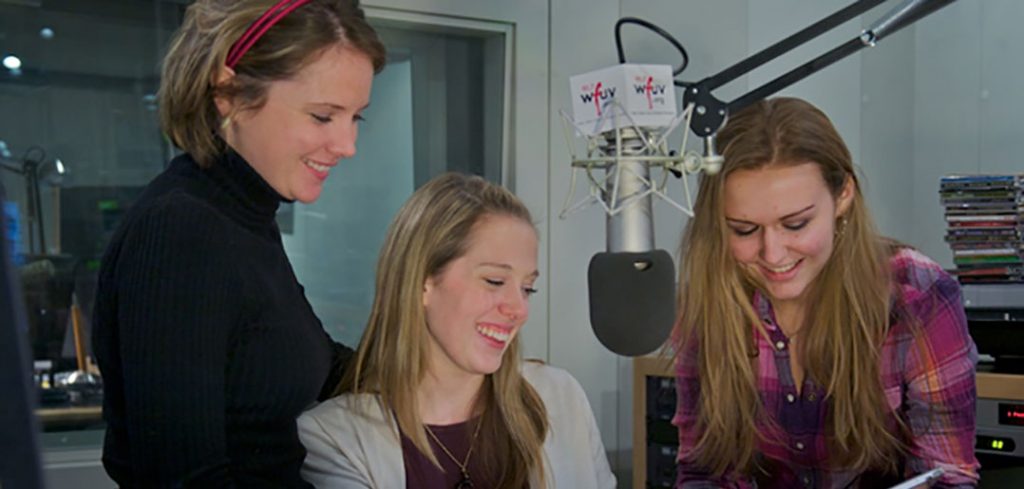“The Music of the Irish” has been hosted by Fordham students on WFUV (90.7 FM), the University’s public media station, since the mid-1970s. And next year, the show’s community of listeners and hosts will celebrate its 50th anniversary with a series of events, including a concert at Symphony Space in Manhattan on January 20. Cillian Vallely and Kevin Crawford of the band Lúnasa, Patrick Mangan and Alan Murray, Séamus Egan of Solas, and Celtic Cross are among the artists expected to perform.
The Voice of Irish New York
Ceol na nGael’s origin story is renowned at WFUV, where the show airs live every Sunday from noon to 4 p.m. In January 1974, Fordham students Gerry Murphy, FCRH ’76, and Mary Maguire, FCRH ’77, proposed a traditional Irish music segment during one of WFUV’s fundraisers. They knew the music would be popular among New York’s Irish expat community, but the result astonished them.
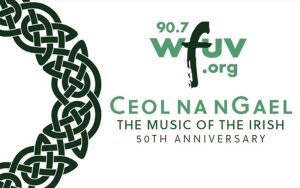 “We were totally unprepared for how the phones exploded during the first program,” Maguire recalled. “The pledges—and the checks—poured in.”
“We were totally unprepared for how the phones exploded during the first program,” Maguire recalled. “The pledges—and the checks—poured in.”
One scheduled hour of Irish tunes quickly grew into four. When Maguire had to leave the studio to go to her waitressing job, listeners called the restaurant to complain. Such was Ceol na nGael’s impact from the very start.
Over the past 50 years, the show has grown to be so much bigger than a short fundraising segment, even bigger than Fordham itself. It has become, quite literally, the community voice of Irish New York. Tuning in to Ceol na nGael on Sundays is what many hosts and listeners describe as a ritual. Frank McCaughey, FCRH ’02, GSE ’08, who hosted the show from 1999 to 2002, called it a “permanent fixture in our lives.” And former host Marie Hickey-Brennan, FCRH ’83, lovingly recalled how her grandmother, born in County Monaghan, Ireland, forbid anyone in the house from speaking during each broadcast so she could hear every note, every word.
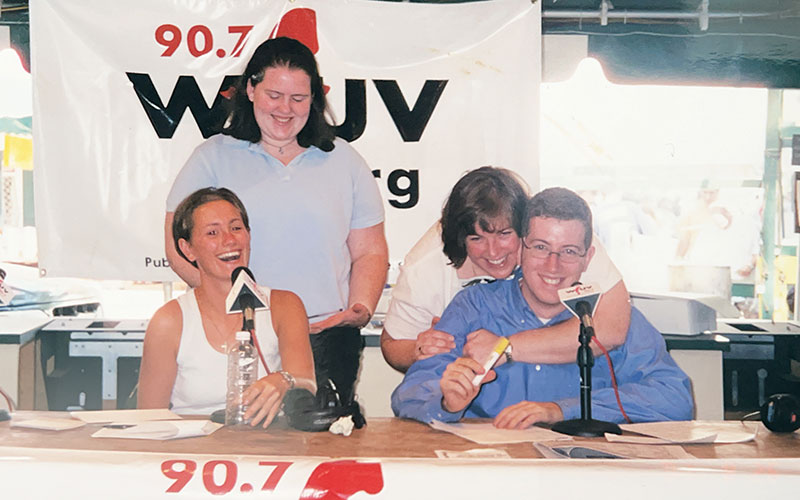
A Loyal Fanbase
Today, Ceol na nGael represents the Irish parish writ large across New York City and the tristate area, providing the intimate familiarity of parochial Ireland to more than 30,000 listeners each week. The broadcasts also reach fans across the Atlantic who tune in to the livestream to connect with the Irish community in New York. One of the show’s distinguishing characteristics is its interaction with listeners. Many of the songs played on air are requested by people who call in, and who get to know the hosts personally.
When asked about their favorite memories of the show’s first five decades, former hosts praised Ceol na nGael’s loyal fanbase. Kevin Quinn, FCRH ’09, marveled at the show’s non-Irish listeners: “It’s just a testament to the program and, of course, the appeal of the ceol.” Kerri Inman (née Gallagher), FCRH ’11, laughed about an interaction with an Irish fan who told her she pronounced her own surname incorrectly. Patrick Breen, FCRH ’22, had arguably the most challenging hosting career, recording the show at home at the start of the COVID-19 pandemic. But the listeners “never failed to provide us with the support and love we needed,” he said.
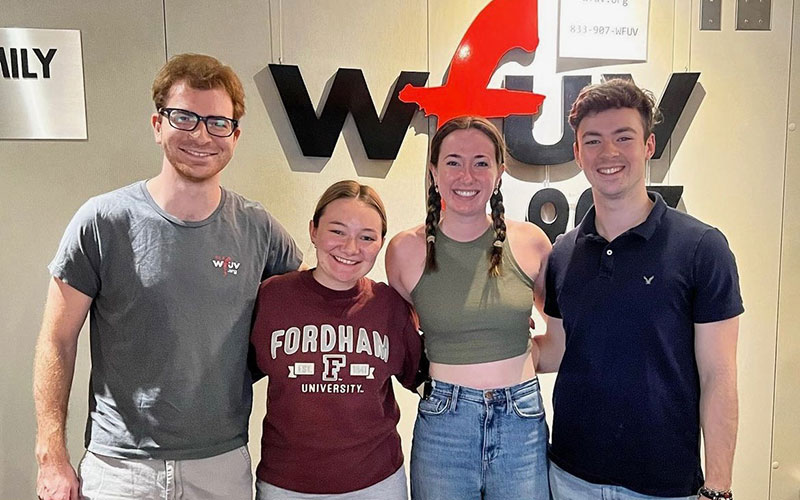
Cultural Ambassadors and Media Professionals
From the beginning, Ceol na nGael has been a notably transformative experience for its student hosts, molding them into young media professionals and ambassadors for Irish culture. I can speak to this from personal experience. Hosting the show from 2009 to 2012 defined my education at Fordham, sending me to Trinity College Dublin for a graduate degree and to my current career as a professor of Irish studies at Boston College. What I do in the classroom and in my scholarship is an extension of what I did in the studio every Sunday: reclaiming Irish creativity and history.
Many other hosts went on to build careers shaped by their time at WFUV, including broadcast journalist Patti Ann Browne, FCRH ’87, who was an anchor at MSNBC and Fox News; Mary Snow, FCRH ’85, who worked at CNN; Deirdre McGuinness, FCRH ’04, who went into professional fundraising; and Kathleen Biggins, FCRH ’87, GSE ’91, who hosts WFUV’s traditional Celtic music show, A Thousand Welcomes, from 8 to 11 on Sunday mornings.
‘Something So Much Bigger Than Myself’
Ceol na nGael has also been part of historically significant moments for the Irish diaspora. Deirdre McGuinness recalled broadcasting the show mere days after 9/11, for example, using Irish ballads to bring the community together through “hope and healing,” she said. And in the early ’90s, Eileen Byrne Richards, FCRH ’93, interviewed young people from Northern Ireland who participated in Project Children‘s summer program, spending time in the U.S. as a reprieve from the Troubles, the violent sectarian conflict between unionists and nationalists. The experience left an indelible impression: “I felt like I was part of something so much bigger than myself, and that still has an impact on me,” she said, expressing a sentiment echoed by all Ceol na nGael hosts, no matter when they stepped to the mic.
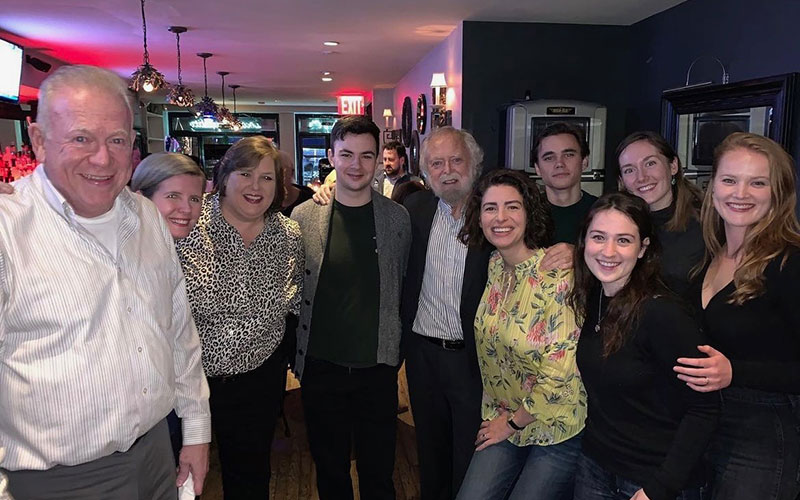
For centuries, folk music has been colonial Ireland’s language of endurance, ever present historical artifact, and compass back home. No one knows this better than Ceol na nGael‘s 40-plus hosts, including current Fordham students Allie Small and Matt Cuzzi. The show regularly airs ballads like “The Fields of Athenry” and “The Town I Loved So Well,” earmarking the history of colonial struggle from which so many Americans are descended. And it has always found the balance in Irish music’s paradoxical duality, between its lament of injustice and its jubilant expression.
As the upcoming 50-year celebration brings to the fore, Ceol na nGael isn’t just entertainment, it is a living, continuously up-to-date archive of Irish cultural resilience. You can join the celebration at the 50th anniversary concert on January 20, 2024, at Symphony Space in Manhattan. Learn more and purchase your tickets at the Symphony Space website.
—Colleen Taylor, Ph.D., FCRH ’12, a professor of Irish studies at Boston College, hosted Ceol na nGael from 2009 to 2012. She is the author of the book Irish Materialisms: The Nonhuman and the Making of Colonial Ireland, 1690-1830, which is scheduled for publication by Oxford University Press in March 2024.
Related stories
Finding Ireland Outside of Its Myths: Personal Notes on the New York-Irish Connection

